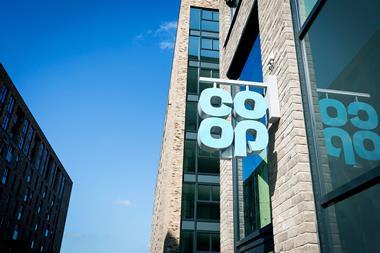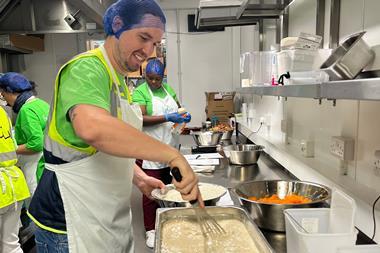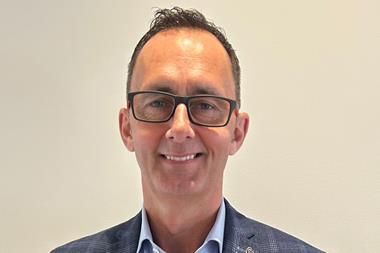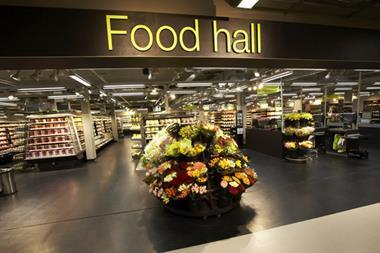Why did Alan Smith have to go? John Wood and Sean McAllister report
One of the most memorable presentations at last year's IGD annual conference was a lively double act by Somerfield executive chairman John von Spreckelsen and chief executive Alan Smith calculated to demonstrate how well they worked together, and how they were going to revive the ailing group.
But precisely a year later, the revival is in danger of running out of steam. Von Spreckelsen has decided to go solo at the Somerfield helm, enabling Smith "to pursue other long-held business ambitions outside the group". The share price has collapsed.
The official explanation for Smith's departure from the board was that Somerfield had decided to concentrate control with von Spreckelsen because having two hands-on bosses was causing confusion. Smith had agreed to stand down in an amicable deal.
All of which sounds quite plausible, notwithstanding last year's performance, but it was the other action surrounding Smith's exit that caused the damage.
At the same time as announcing the changes, Somerfield also put out a trading statement saying that market conditions had suddenly worsened because of lower market growth and deflationary pressure, and that operating profit was only likely to be at last year's level. Analysts, who had been forecasting pre-tax profits of around £45m for the year, cut that to just £20m.
This, just a week after it was announced that financial director Martin Gatto was to be replaced by Budgens group finance director Steven Back (The Grocer, October 12, p20).
The City, which hates surprises at the best of times, and which in the current climate is ultra-jittery, wiped almost 50% off the share value in one day. It plummeted 45p to 50p.
The slump in Somerfield's share price was despite the fact it also revealed that for the first seven weeks of the second quarter, like-for-like sales were up 1.7% compared with 0.3% for the first quarter.
Even though the trading statement forecasted poorer than expected profit figures, the question many people were asking was  why did Smith have to go? Since he joined the company two years ago, its fortunes have revived. It moved back into profit earlier this year, is debt-free, and its store refurbishment programme appears to be working. But analyst Philip Dorgan of West LB Panmure says: "Profit was not in line, so someone had to carry the can. The board decided on Alan Smith." But he expresses sympathy for Smith. "It was an accident waiting to happen. Somerfield will just continue as before. It won't go bust, as it has no debt, but it has no great assets or brands. No one wants to buy it. It's in a tough market. There is no sustainable answer."
Mike Dennis at CAI Cheuvreux says: "I can't see how Somerfield/Kwik Save stores on the high street can combat the roll-out of new high street formats such as Tesco Express and Sainsbury Local. There seems no way Kwik Save can roll out its new concept stores in time to combat attrition."
Even John von Spreckelsen's record of turning around struggling businesses  he worked the trick in Germany and most recently with Budgens  seems to be cutting little ice with investors at present.
However Richard Ratner of Seymour Pierce says: "Von Spreckelsen is worth backing. When he took over Budgens, it got worse before he turned it round."
But this time the veteran turnaround specialist faces his toughest battle yet.
{{ANALYSIS }}
One of the most memorable presentations at last year's IGD annual conference was a lively double act by Somerfield executive chairman John von Spreckelsen and chief executive Alan Smith calculated to demonstrate how well they worked together, and how they were going to revive the ailing group.
But precisely a year later, the revival is in danger of running out of steam. Von Spreckelsen has decided to go solo at the Somerfield helm, enabling Smith "to pursue other long-held business ambitions outside the group". The share price has collapsed.
The official explanation for Smith's departure from the board was that Somerfield had decided to concentrate control with von Spreckelsen because having two hands-on bosses was causing confusion. Smith had agreed to stand down in an amicable deal.
All of which sounds quite plausible, notwithstanding last year's performance, but it was the other action surrounding Smith's exit that caused the damage.
At the same time as announcing the changes, Somerfield also put out a trading statement saying that market conditions had suddenly worsened because of lower market growth and deflationary pressure, and that operating profit was only likely to be at last year's level. Analysts, who had been forecasting pre-tax profits of around £45m for the year, cut that to just £20m.
This, just a week after it was announced that financial director Martin Gatto was to be replaced by Budgens group finance director Steven Back (The Grocer, October 12, p20).
The City, which hates surprises at the best of times, and which in the current climate is ultra-jittery, wiped almost 50% off the share value in one day. It plummeted 45p to 50p.
The slump in Somerfield's share price was despite the fact it also revealed that for the first seven weeks of the second quarter, like-for-like sales were up 1.7% compared with 0.3% for the first quarter.
Even though the trading statement forecasted poorer than expected profit figures, the question many people were asking was  why did Smith have to go? Since he joined the company two years ago, its fortunes have revived. It moved back into profit earlier this year, is debt-free, and its store refurbishment programme appears to be working. But analyst Philip Dorgan of West LB Panmure says: "Profit was not in line, so someone had to carry the can. The board decided on Alan Smith." But he expresses sympathy for Smith. "It was an accident waiting to happen. Somerfield will just continue as before. It won't go bust, as it has no debt, but it has no great assets or brands. No one wants to buy it. It's in a tough market. There is no sustainable answer."
Mike Dennis at CAI Cheuvreux says: "I can't see how Somerfield/Kwik Save stores on the high street can combat the roll-out of new high street formats such as Tesco Express and Sainsbury Local. There seems no way Kwik Save can roll out its new concept stores in time to combat attrition."
Even John von Spreckelsen's record of turning around struggling businesses  he worked the trick in Germany and most recently with Budgens  seems to be cutting little ice with investors at present.
However Richard Ratner of Seymour Pierce says: "Von Spreckelsen is worth backing. When he took over Budgens, it got worse before he turned it round."
But this time the veteran turnaround specialist faces his toughest battle yet.
{{ANALYSIS }}



















No comments yet